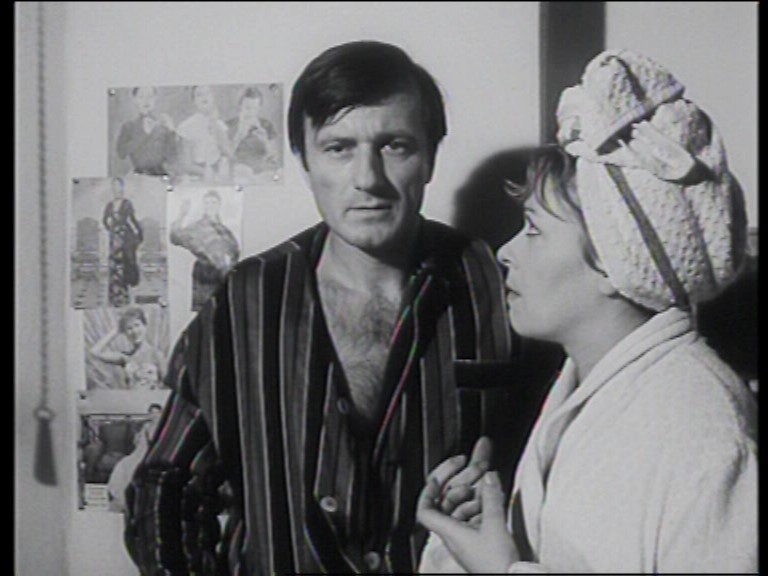 Like most of the films that were made during the burst of film making creativity in the late 60s in the former Czechoslovakia, The Ear was banned - the authorities took a disliking to the open criticising of the methods employed by the secret police to spy on its own government officials.
Like most of the films that were made during the burst of film making creativity in the late 60s in the former Czechoslovakia, The Ear was banned - the authorities took a disliking to the open criticising of the methods employed by the secret police to spy on its own government officials.A middle aged couple, Ludvik (a high ranking bureaucrat) and his tipsy wife Anna return home from a party to find that she has lost her keys and that they are locked out. Ludvik breaks in to find that the keys are inside and the power and telephone is cut (yet the power at their neighbours is clearly on), whilst Anna rebukes him for his efforts as the gate was open. These small odd occurances combined begin to unsettle the couple and open existing wounds in their marriage (think Who's Afraid of Virginia Woolf? under a totalitarian regime perhaps).
Thinking over events at the party, Ludvik begins to wonder whether he is under surveillance by the state, like a recent colleague who has since been arrested. He disposes of anything incriminating (which blocks the toilet) and takes care with what he says, partially drowning his conversations with Anna with the radio, though she doesn't share Ludvik's suspicions until she seens men furtively wandering in the gardens.
When the power returns and a number of men appear at the gate, frantically ringing, both assume Ludvik is about to be taken away, though it emerges that these men are friends of his from the party. Anna's paranoia outstrips Ludvik's, who at least superficially seems calm and reassured, though this is probably a facade whilst he tries to figure out what's going on. By the morning however, all becomes clear of the purpose of these men. For the rest of the evening, Ludvik and Anna project their fears onto each other and become totally frank about their loathing for one another in order to hurt the other - Anna taunts Ludvik with her history of promiscuity, whilst he tells her he was only interested in her money. However, when they find bugging devices all over their home (planted by their guests), this almost solidifies their marriage as they have to work together to save themselves. In a blackly comic denouement, Ludvik is promoted to replace Kosara, his friend who was recently arrested, though the future is somewhat indeterminate.
Similar to The Party and the Guests in its commentary of the power of the state, The Ear is far more open and far less cryptic than the former. It demonstrates the personal effects of political actions and the impact that fear and paranoia, rather than overt action, has on a marriage. Not that we find either Ludvik or Anna that sympathetic - both are driven by self interest and opportunism, which is possibly the way to get ahead in a totalitarian society. It's perhaps fitting therefore that even after Ludvik's promotion, both remain cautious and concerned for the future, no doubt in light of what happened to the previous incumbent of that post. Where Ludvik and Anna go from the long night that has just passed, who knows?
No comments:
Post a Comment